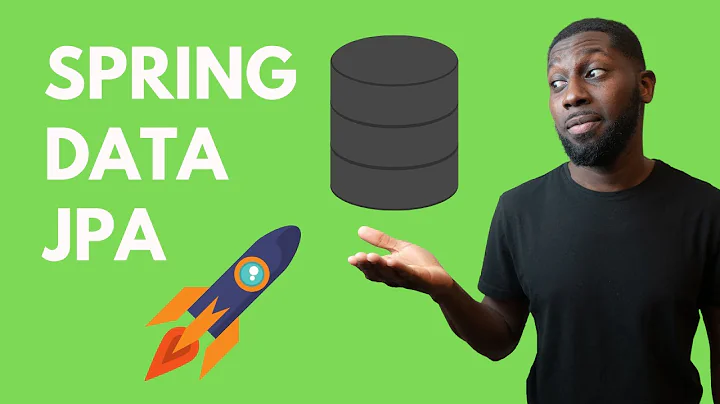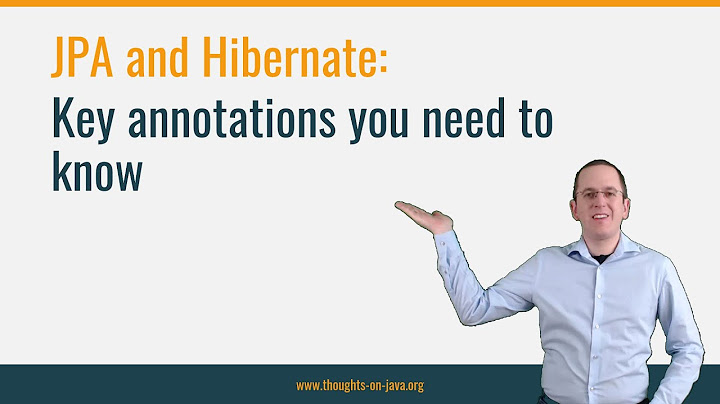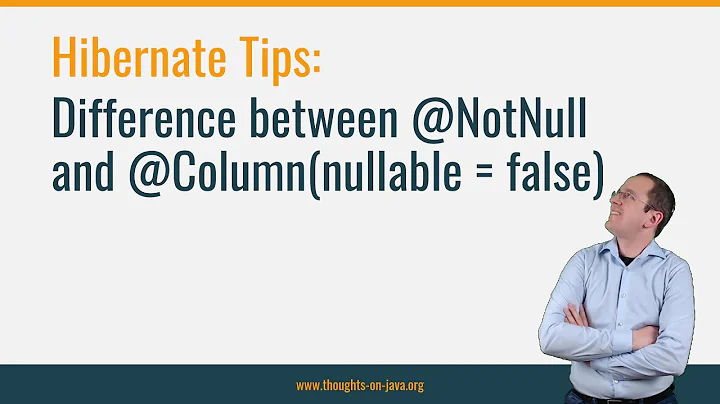Please explain about insertable=false and updatable=false in reference to the JPA @Column annotation
Solution 1
You would do that when the responsibility of creating/updating the referenced column isn't in the current entity, but in another entity.
Solution 2
Defining insertable=false, updatable=false is useful when you need to map a field more than once in an entity, typically:
- when using a composite key
- when using a shared primary key
- when using cascaded primary keys
This is IMO not a semantical thing, but definitely a technical one.
Solution 3
I would like to add to the answers of BalusC and Pascal Thivent another common use of insertable=false, updatable=false:
Consider a column that is not an id but some kind of sequence number. The responsibility for calculating the sequence number may not necessarily belong to the application.
For example, sequence number starts with 1000 and should increment by one for each new entity. This is easily done, and very appropriately so, in the database, and in such cases these configurations makes sense.
Solution 4
An other example would be on the "created_on" column where you want to let the database handle the date creation
Solution 5
According to Javax's persistence documentation:
Whether the column is included in SQL UPDATE statements generated by the persistence provider.
It would be best to understand from the official documentation here.
Related videos on Youtube
Thang Pham
Updated on June 25, 2021Comments
-
Thang Pham almost 3 years
If a field is annotated
insertable=false, updatable=false, doesn't it mean that you cannot insert value nor change the existing value? Why would you want to do that?@Entity public class Person { @Id @GeneratedValue(strategy = GenerationType.AUTO) private Long id; @OneToMany(mappedBy="person", cascade=CascadeType.ALL) private List<Address> addresses; } @Entity public class Address { @Id @GeneratedValue(strategy = GenerationType.AUTO) private Long id; @ManyToOne @JoinColumn(name="ADDRESS_FK") @Column(insertable=false, updatable=false) private Person person; } -
Jayant almost 9 yearsI strongly believe that this answer is much better that the accepted one. The accepted answer conveys the feeling that insertable/updatable attribute has to do with the creation/update of the related entity, whereas the real intention behind these attributes is to prevent insertion/update of the column in the current entity. The creation/update of the related entity is tackled by the cascade attribute of the mapping annotation.
-
eis over 8 yearssequences are supported by JPA as well, so you could define your sequence with JPA annotations, too.
-
Flowy over 7 yearsYou are saying that with updatable=false on Person it will disable updating of Person.name when updating address (I disagree as this is the purpose of cascade). Also u are saying that @Column definition does something different when its foreign key (Person) and when it is not foreign key (as there is no referenced entity to disable updating). By reading javadoc for updatable I would say that it will just disable to change Person for given Address if it is once persisted. Can you explain please?
-
 chrisinmtown about 6 yearsIs Hibernate supposed to block updates based on an updatable=false annotation? In my JPA repository test a created_on column with this annotation accepts updates without complaint.
chrisinmtown about 6 yearsIs Hibernate supposed to block updates based on an updatable=false annotation? In my JPA repository test a created_on column with this annotation accepts updates without complaint. -
Jaqen H'ghar over 5 years@chrisinmtown Eclipselink will not include the column in the sql at all. I expect it is the same with Hibernate
-
 Daniel Pop over 3 yearsactually this is the response I came for
Daniel Pop over 3 yearsactually this is the response I came for -
Zyl over 3 yearsIsn't this sufficiently defined by the cascade options already? I saw this being used to not run into trouble by trying to write to a generated column. (e.g. a volume column
GENERATED ALWAYS AS (height * width * length) VIRTUAL) -
 GlauberMD almost 2 yearsIt helped me understand why a column annotated with
GlauberMD almost 2 yearsIt helped me understand why a column annotated with@CreatedDateand/or@UpdateTimestampwas not getting updated if it also has@Column(...insertable=false, updatable=false). Thanks!






